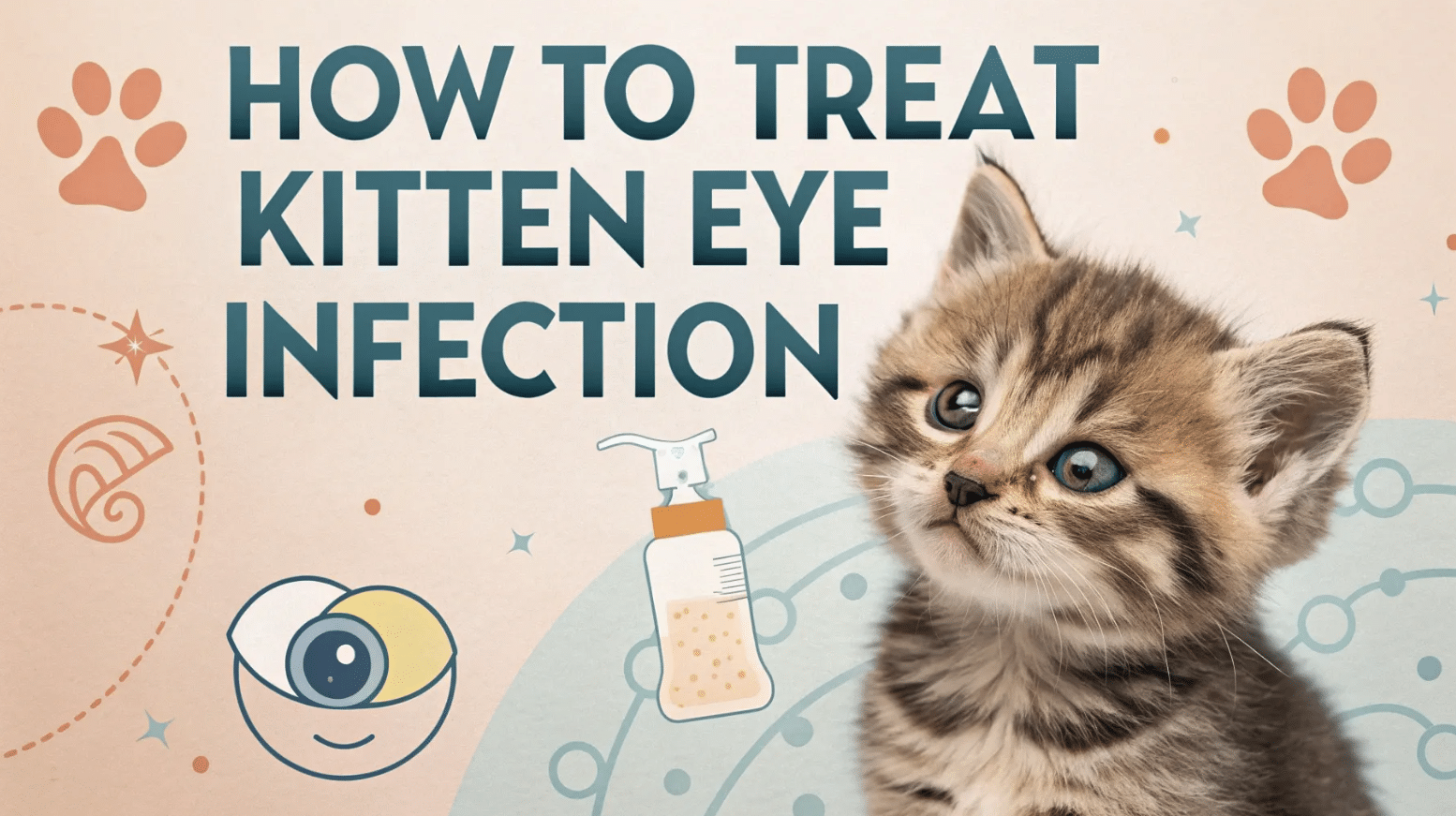
Kitten eye infections can escalate quickly if left untreated. Untreated conditions like conjunctivitis may cause corneal ulcers, chronic pain, or even blindness. You can often manage mild cases with proper care. Learning how to cure a kitten’s eye infection at home ensures your kitten’s comfort and prevents complications.
It is also important to monitor symptoms closely and get them to a vet if the condition worsens.
How to Identify a Kitten Eye Infection
Common Symptoms of Kitten Eye Infections
Recognizing the signs of a kitten eye infection early can make a big difference in your pet’s recovery. Symptoms often appear in one or both eyes and may vary in severity.
Look for these common indicators:
-
Clear, yellow, or green discharge
-
Swelling around the eyelids
-
Cloudiness in the eye
-
Squinting, blinking excessively, or keeping the eye closed
-
Pawing or rubbing at the eye, which signals discomfort
-
A visible third eyelid covering part of the eye
These symptoms may also accompany cat conjunctivitis, a common condition in kittens. If you notice any of these signs, monitor your kitten closely to determine whether the infection is mild or severe.
Differentiating Between Mild and Severe Infections
Mild infections often involve slight redness, minimal discharge, or occasional squinting. These cases can usually be managed at home with proper cleaning and care. However, severe infections require immediate veterinary attention. Signs of a more serious issue include:
-
Thick yellow or green discharge that crusts around the eye
-
Significant swelling or bulging of the eyelids
-
Persistent redness or cloudiness
-
A collapsed or sunken eyeball
-
Total closure of the eye due to pain or swelling
Severe infections, if left untreated, can lead to permanent damage, vision loss, or even blindness. Always err on the side of caution. If your kitten’s symptoms worsen or fail to improve within a few days, consult a veterinarian promptly.
Causes of Kitten Eye Infections
Bacterial and Viral Infections
Bacterial and viral infections are common culprits behind kitten eye problems. These infections can spread quickly, especially in multi-cat households or shelters. Some of the most frequent causes include:
-
Viral Infection: Feline Herpes Virus (FHV) often triggers conjunctivitis and other eye issues.
-
Bacterial Infections: Chlamydia, Mycoplasma, Staphylococcus, and Streptococcus can lead to redness, swelling, and discharge.
You can reduce the risk of these infections by ensuring your kitten receives timely vaccinations and lives in a clean, stress-free environment.
Environmental Irritants and Allergies
Your kitten’s surroundings play a significant role in their eye health. Irritants and allergens can cause inflammation, leading to symptoms that mimic infections. Common triggers include:
-
Dust and debris in the home
-
Detergents or cleaning agents not designed for pets
-
Particles from the litter box
To protect your kitten, maintain a clean environment. Regularly sterilize their bedding, toys, and litter area. Use pet-safe cleaning products to avoid accidental exposure to harmful chemicals. These steps can significantly lower the chances of irritation and infection.
Underlying Health Issues
Some kittens are more prone to eye infections due to underlying health problems. Neonatal ophthalmia, caused by delayed eyelid opening, is one example. Other risks include:
-
Infections passed during birth, such as those from Feline Chlamydophila or herpesvirus type-1
-
Weak immune systems in newborns, especially premature kittens or those without maternal antibodies
-
Stress, dirt, or concurrent illnesses that compromise overall health
If your kitten has recurring eye infections, consult a veterinarian. Identifying and addressing the root cause ensures long-term relief and better health for your furry friend.
How to Cure Kitten Eye Infection at Home
What You Need for Home Treatment
Gathering the right supplies is essential before starting any treatment for kitten eye infections. You’ll need:
-
Clean cotton balls or soft cloths
-
Warm water or saline solution (.9% sodium chloride)
-
Vet-approved eye drops or ointments (if prescribed)
-
A quiet, well-lit space for the procedure
-
Warm, canned food to encourage eating if your kitten feels unwell
Having these items ready ensures you can treat your kitten’s eyes effectively and without unnecessary delays.
Step-by-Step Instructions for Cleaning the Eyes
Follow these steps to clean your kitten’s infected eyes safely:
-
Use a clean cotton ball dampened with warm water to gently wipe away discharge. Start from the inner corner of the eye and move outward.
-
Soak a cotton ball in boiled (and cooled) water if the eyelids are stuck shut. Hold it over the eye for a few seconds to loosen the crust.
-
Pat the area dry with a fresh cotton ball. Avoid reusing the same cotton ball to prevent spreading the infection.
-
Repeat this process for the other eye using a new cotton ball.
Consistency is key. Clean the eyes as often as needed to keep them free of discharge.
Using Saline Solution or Vet-Approved Eye Drops
Saline solution or vet-approved eye drops can help treat eye infections effectively. Use them as follows:
-
Flush the eye gently with saline solution to remove debris and soothe irritation.
-
Apply the prescribed eye drops or ointment directly into the eye. Follow your veterinarian’s instructions for dosage and frequency.
-
Ensure the kitten stays calm during the process. A soft towel can help secure them if they squirm.
These steps can complement other cat eye infection home remedies, ensuring a thorough approach to healing.
Monitoring Progress and Signs of Improvement
Keep a close eye on your kitten’s recovery. Signs of improvement include:
-
Reduced eye discharge
-
Clearer, less swollen eyes
-
Increased activity and appetite
Daily cleaning and monitoring are crucial. If symptoms persist or worsen, consult your veterinarian immediately.
Potential Challenges During Home Treatment
Treating eye infections at home can present challenges. Misdiagnosis may lead to incorrect treatments, delaying proper care. Eye infections caused by underlying diseases may require professional intervention. Moreover, kittens might be reluctant to undergo treatment, which can make it a stressful experience for both of you.
Common Mistakes to Avoid When Treating Cat Eye Infections
Avoid these common errors when you treat cat eye infections:
-
Misdiagnosing the condition and using inappropriate remedies
-
Delaying treatment, which can worsen the infection
-
Reusing cleaning materials, increasing the risk of spreading bacteria
Always follow veterinary guidance when learning to cure kitten eye infection at home. Proper care ensures your kitten’s quick recovery and long-term health.
When to Seek Veterinary Care for Kitten Eye Infections
Signs That Require Immediate Veterinary Attention
Some eye infections in kittens require urgent professional care. You should contact a veterinarian immediately if you notice any of the following signs:
-
Eyes that are oozing, crusted, or sealed shut in kittens older than 2.5 weeks
-
Discharge that is clear, yellow, or pus-like
-
Eyelids sticking to the surface of the eyes
-
Swollen eyelids that appear to bulge outward
-
Sores or ulcers on the surface of the eye
-
A collapsed or sunken eyeball
These symptoms often indicate a severe infection or underlying condition that cannot be treated at home. Early intervention can prevent complications and ensure your kitten’s comfort.
Risks of Delaying Professional Treatment
Delaying veterinary care for a kitten’s eye infection can lead to serious consequences. Untreated infections may cause:
-
Permanent damage to the eye
-
Vision loss or blindness
-
The potential loss of the eye itself
Infections caused by contagious diseases, such as feline herpesvirus, can spread to other pets in your home. Treating a severe infection at home without proper diagnosis may worsen the condition. Misdiagnosis and improper remedies can delay healing and increase the risk of complications.
Seeking timely veterinary care protects your kitten’s health and prevents long-term issues. If symptoms persist or worsen despite home treatment, consult a veterinarian immediately.
Early identification and proper home care can effectively resolve mild kitten eye infections. Monitor symptoms closely and follow your vet’s guidance to avoid complications. Severe or persistent infections require immediate veterinary attention.
Prioritize your kitten’s health by seeking professional advice when needed. Timely care ensures your kitten’s comfort and protects their vision.

In her previous life, Lisa traveled extensively, both for work and leisure. After the pandemic struck, Lisa locked up her luggage and adopted a cat ever since.
Lisa is now an avid cat lover, she devotes most of her free time serving as butler to her adorable feline at home. When she is not with her cat, she can be seen using her phone sourcing for the latest cat supplies online.


